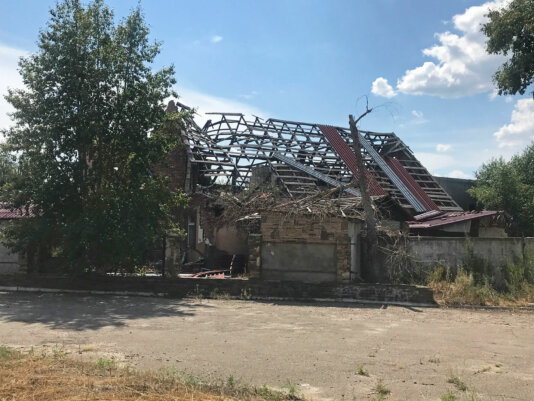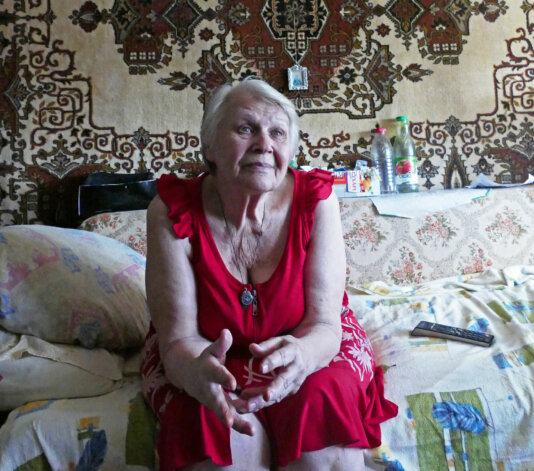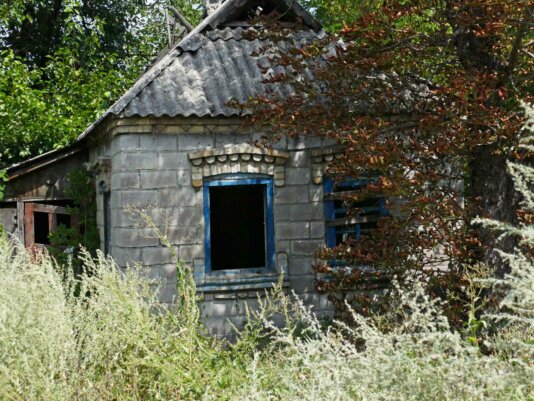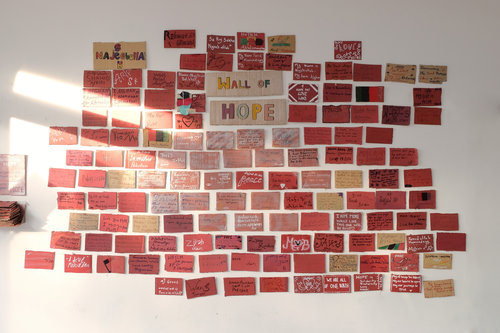- About
- Topics
- Picks
- Audio
- Story
- In-Depth
- Opinion
- News
- Donate
-
Signup for our newsletterOur Editors' Best Picks.Send
Read, Debate: Engage.
| October 07, 2021 | |
|---|---|
| topic: | Human Rights |
| tags: | #Ukraine, #war, #elderly, #disabilities |
| located: | Ukraine |
| by: | Sara Cincurova |
The 85-year old has been a witness to war since 2014, when an armed conflict broke out in the Donbas region of eastern Ukraine. With soldiers and snipers now surrounding her house, she hides inside her room and hopes she will not become a target.
In eastern Ukraine, ‘Europe’s forgotten war’ that broke out in May 2014 still threatens civilians like Lidiia despite a July 2020 ceasefire, with a total of 3,387 civilian deaths and more than 7,000 casualties recorded by 2021.
Lidiia is one of the many elderly inhabitants who have been unable to leave the war zone due to their high age, disability, mobility issues or lack of resources. She is now the only inhabitant of her street in the government-controlled area, surrounded by destroyed, empty houses, and is too scared to go out because of explosives. She lives without water, food or medications, and hasn't left the house for seven years, since the outbreak of the war.
Her only resource of money is her small pension. While all the younger inhabitants of her street had already fled the conflict zone, Lidiia had no choice but to remain. She survives by receiving food and medication supplies from the local volunteers who distribute aid to the elderly, despite the fact that explosive remnants of war are present around the area.
“When I am dizzy and fall on the floor, there is no-one to pick me up,” Lidiia says. “But I have lived in this house my entire life, and I do not want to leave, even if I could,” she adds.
This means that she hears fighting, shooting and shelling that take place near her house almost every night, according to her words.
Since 2014, when the conflict broke out in the aftermath of the Euromaidan movement, Russian-backed separatist groups have seized the Ukrainian regions of Donetsk and Luhansk, also known as the Donbas. The frontline, also called the “contact line”, is now dividing the separatist-backed regions from the government-controlled areas, and is marked by sporadic fighting.
The number of casualties in the zone is also rising, causing increased distress for the local people. An OHCHR report reported that 12 civilians were killed and 25 more injured due to shelling, fire and mines between February and April 2021 alone, representing a 270 percent increase compared with the three previous months.
“Despite the high needs, the conflict in eastern Ukraine continues to be a forgotten crisis with little media coverage,” says Alyona Budagovska, a communications manager at People in Need, an NGO present on the frontline.
According to the NGO, the conflict maintains its own peculiarity: the high percentage of older people that are impacted.
Volodymyr Kuzka, a Programme officer for the Kyiv-based EU Humanitarian Aid confirmed that some 3.4 million of the people in need live along the contact line, including 1.3 million elderly persons and 442,000 individuals with disabilities.
This also means that many of the people remaining on the frontline face mobility issues and health problems related to their high age and to the highly distressing situation to which they are exposed.
A 2021 OCHA report estimates that out of the total number of people in need in Ukraine, 13 percent have a disability.
The needs are therefore very high for the remaining populations on both sides of the 427km-long contact line.
Vera, a 75-year-old blind woman who lost her sight while exposed to shelling, cries as she explains that she is terrified of the sound of shooting she hears every day from her house in Chasiv Yar, several kilometers away from the contact line.
“In 2014, when the conflict broke out and I heard the shelling, I ran outside to look what was happening. Out of the stress and trauma, I lost my sight,” she says. “The following day, I went outside and realised that I could not see. I was running amid the destroyed houses, shouting ‘I am blind’,” Vera says, with tears streaking down her face.
Today, Vera says she does not have money to buy bread. Food supplies became very expensive in the war zone and Vera’s pension is not enough.
“I never thought I would have to end my life like this: blind, hungry and in a war zone,“ she says.
In order to move around her one-bedroom flat, she has to bend down and touch the floor and the furniture with her hands to get a sense of where she is. Like many other inhabitants of the war zone, she speaks about suicide.
Fighting and other traumatic events continue to hit local people like Vera on a regular basis. On 5 August 2021, a house was targeted by a shell, leaving a man injured in the town of Krasnohorivka. Local people report that they can hear shooting not only at night, but also during the daytime.
As a result, many had to come up with ways of coping with the risks: elderly men in the town of Marinka say they wrap head scarves around their heads, disguised as women to decrease the likelihood of getting shot; other people avoid using their outside toilets at night, so that they can’t be targeted by snipers.
Life on the frontline is challenging not only for elderly people, but also for aid organisations providing help to those who stayed.
“In 2022, People in Need and its partners aim to help 96,097 people through complex humanitarian assistance including health and mental health services; water, sanitation, cash and vouchers, funded through a 5.6 million-euro project supported by the EU,” Budagovska says.
But volunteers and NGOs delivering support to vulnerable populations must be mindful of the hostile environment and observe policies to ensure their safety, particularly along the contact line.
The European Union also provides support. “In 2021, EU humanitarian funding helps people access healthcare, including better preparation and response to the COVID-19 pandemic,” Volodymyr Kuzka said. “The funding supports the rehabilitation of damaged houses, schools and hospitals. It provides affected people with the means to meet their basic needs and access safe water, education in emergencies and protection services.”
Despite the challenging environment, NGOs like People in Need and many other local volunteers also continue to bring food, medications, vouchers and other supplies and services to the elderly, disabled and isolated persons living in the conflict zone.
For many of the elderly people, NGOs are their only hope. In an environment in which many are unable to leave their houses due to mobility issues and fear of explosives, the work of local volunteers and NGOs is the only way to ensure they have regular access to food and medication.
“[The] international community shouldn’t forget that people living close to the contact line are in a desperate security situation and are daily exposed to shelling, landmines and unexploded remnants," Budagovska said. "In addition, armed clashes continue to damage important civilian infrastructure adding more complications to the already suffering population.”
Image by: Sara Cincurova
By copying the embed code below, you agree to adhere to our republishing guidelines.



